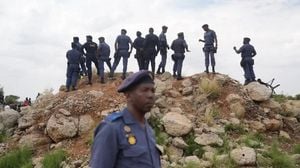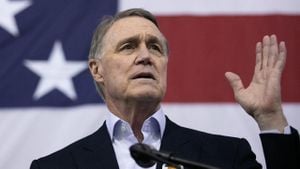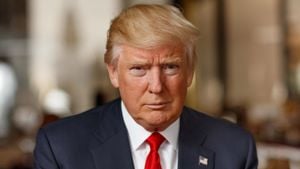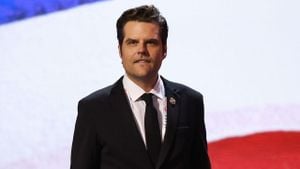Donald Trump's potential pardons for those involved in the January 6th Capitol riot are igniting considerable debate within legal circles and among his supporters. With the upcoming 2024 presidential campaign creating buzz, the idea of mass pardons hangs heavily over the political atmosphere.
Recently, U.S. District Judge Carl Nichols, nominated by Trump himself, voiced his reservations about the possibility of blanket pardons for Capitol rioters, stating it would be "beyond frustrating and disappointing." This sentiment reflects the concerns of many who fear the impact such pardons could have on justice and accountability.
During proceedings involving defendants from the riot, Judge Nichols noted the reality of pardons adding complexity to legal processes surrounding over 1,500 cases stemming from the attack. This unprecedented consideration raises questions about due process and fairness within the judicial system.
Among the high-profile figures currently facing charges is Jacob Lang, who has expressed hope for receiving presidential clemency. After Trump's victory, Lang hailed the news on social media, proclaiming he is among the "political prisoners" bound to be released as pardons become likely.
It’s not just the rioters bated breath waiting for possible pardons; supporters of these individuals, like Derrick Evans, one of the participants who later pleaded guilty, hope for their early release. Evans stated, "A pardon will be life changing," which highlights the anticipation surrounding the issue.
Trump's statements throughout his campaign have fueled the expectation of mass pardons. He has repeatedly referred to the rioters as "patriots" and indicated his willingness to grant them clemency—asserting he would pardon anyone he deems innocent. While he’s made clear his intentions to act on their behalf, specifics remain elusive, with his aides commenting decisions will be made on a "case-by-case basis."
The effects of the January 6th unrest continue to linger, with many rioters optimistic about their former president aiding their release. For some, like Joe Biggs from the Proud Boys, expectations for pardon hinge significantly on their view of the political environment under Trump's potential return to the White House.
Trump’s recent statements hint at his desire to address those imprisoned for their roles on January 6th, described on his Truth Social account as "hostages." The connection he draws with this language echoes sentiments among his supporters who share his belief of victimization by the justice system.
While the canvas painted by Trump and those optimistic about pardons may seem vibrant, it's not without underlying tension. Legal experts caution against knee-jerk reactions, pointing to the considerable evidence against many defendants. Just last week, more rioters faced charges with the FBI continuing to pursue additional suspects linked to violent assaults during the Capitol siege.
Despite the judicial pushback, hopes remain high among some defendants for favorable outcomes post-election. Judge Nichols is among several who have previously declined to delay proceedings solely based on speculation over potential pardons—effectively reaffirming the court's commitment to uphold due process.
Meanwhile, prominent conservative voices echo sentiments of disgust toward any form of blanket pardons, signaling resistance against undermining judicial integrity. Several judges, including U.S. District Judge Christopher Cooper, have similarly dismissed requests for trial delays based on pardon forecasts, reinforcing the broader debate within the legal community about the ramifications of pardons.
Given this background, the debate on Trump's possible pardons emerges from complex legal standards, the varying degrees of culpability among rioters, and the political climate surrounding his campaign. Observers fear such actions could weaken the legal system's authority and send troubling messages about accountability for violence.
With criminal investigations still underway and arrests continuing, many remain decidedly uncertain about the future of these Capitol rioters. Prosecutors are emphasizing trials for the most severe cases, mindful of the potential pardons looming on the horizon.
Looking forward, time will tell whether Trump's anticipated presidency will change the fate of many still facing consequences from the infamous events of January 6th. Amid courtroom deliberations, social media rhetoric, and public discourse, the legal and moral questions surrounding potential pardons persist, shaping the dialogue around justice and governance.



